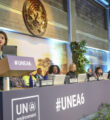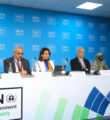Climate Finance: World Bank Provided Record $31.7Bln in Fiscal Year 2022
Washington – The World Bank Group delivered a record $31.7 billion in fiscal year 2022 (FY22) to help countries address climate change.
This is a 19% increase from the $26.6 billion all-time high in financing reached in the previous fiscal year, the World Bank said in a press release.
The Bank Group continues to be the largest multilateral financier of climate action in developing countries.
“In our last fiscal year ending June 2022, we provided a record $31.7 billion to countries to identify and enable high-priority climate-related projects as part of their development plans,” said David Malpass, President of the World Bank Group.
“We will continue providing solutions to pool funding from the global community for impactful and scalable projects that reduce GHG emissions, improve resilience, and enable the private sector,” he added, as quoted in the release.
Financing for climate action in FY22—which covers July 1, 2021, to June 30, 2022—reached 36% of total Bank Group financing.
This exceeds the target set in the Group’s Climate Change Action Plan for 2021-2025 to deploy an average of 35% of the institution’s financing in support of climate action.
IBRD and IDA together delivered $26.2 billion in FY22 in climate finance. Nearly half of that—$12.9 billion—specifically supported investments in adaptation and resilience.
IFC, the private sector arm of the World Bank Group, delivered an unprecedented $4.4 billion in climate finance and mobilized an additional $3.3 billion from other sources.
MIGA, the World Bank Group’s political risk insurance and credit enhancement arm, delivered $1.1 billion in climate finance.
As part of its ongoing effort to help countries integrate climate and development objectives, the Bank Group recently launched a number of Country Climate and Development Reports (CCDRs).
CCDRs are a new core diagnostic to help countries prioritize the most impactful actions that can reduce GHG emissions and boost adaptation. A summary of the preliminary findings of these reports will be published in coming months to foster action-oriented discussion in the global community.













